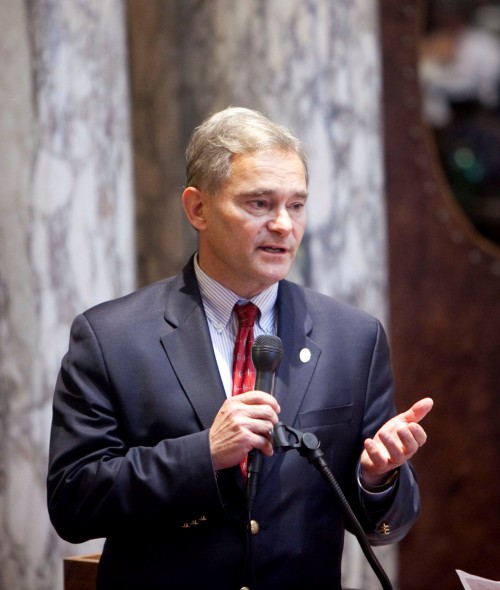Assembly Dems Point Way to Reform
Their Clean Elections Act seeks to fix broken campaign finance law.
Wisconsin Assembly Democrats are on the right track in their efforts to fix our broken campaign finance law.
At their press conference on Oct. 19, Reps. Peter Barca, Gary Hebl, Fred Kessler, Katrina Shankland, and Dana Wachs sketched out their Clean Elections Act, which they intend to introduce in the next session.
It addresses some of the key defects in Wisconsin’s current campaign finance law.
Number one, it would require the disclosure of the donors to the outside groups that are running those phony issue ads at election time. The public should know who is paying for the mud that’s splattering our TV screens, and who is trying to buy influence with elected officials.
Number two, it would prevent candidates and legislators from setting up their own PACs or issue advocacy groups. While Senate Majority Leader Scott Fitzgerald said on the Senate floor that the campaign finance law wouldn’t allow this, the Ethics Commission ruled last week that it does, as it dismissed the Wisconsin Democracy Campaign’s complaint against Rep. Dean Knudson, who already has set up his own PAC. This is a ridiculous loophole that now seemingly allows legislators to establish their own issue advocacy or express advocacy groups. This loophole renders meaningless the limits on campaign donations because donors can give unlimited amounts to the legislator’s outside group, which they can’t to the legislator’s campaign committee. And if it’s an issue advocacy group, we’ll never know who is making those donations because the group, which the legislator controls, doesn’t have to disclose its donors.
The new bill would strengthen the definition of coordination to include any expenditure made in “cooperation, consultation, or concert” with a candidate. “Cooperation, consultation, or concert” means an expenditure “not made entirely independently of a candidate,” which means “pursuant to any general or particular understanding with, or pursuant to any communication with” the candidate.
Number four, it would identify a group that uses words and phrases that are the “functional equivalent” of “Vote For” or “Vote Against” as an express advocacy group.
The Wisconsin Democracy Campaign urges the Assembly Democrats to include the following additional changes:
1. Prohibit unlimited donations
These give the wealthiest individuals an inordinate amount of influence over our government. Under the current law, there are no limits on the following:
- contributions to a PAC
- contributions to a legislative campaign committee
- contributions to a political party
- contributions to a candidate committee by a political party or legislative campaign committee
- contributions between PACs
- contributions between candidates for governor and lieutenant governor of the same party
- contributions used to pay legal fees and other expenses incurred as a result of an election recount
- contributions to a recall committee
- contributions to pay legal fees and other expenses connected to petitioning for a recall before the actual recall election is ordered
- contributions to a referendum committee
- contributions to an independent expenditure committee
None of these contributions should be able to exceed $10,000.
2. Reinstate the ban on corporate contributions
For 111 years, until the legislature rewrote the campaign finance law last November, Wisconsin prohibited corporations from contributing to candidates, candidate committees, or political parties. This ban should be reinstated.
3. Require the listing of employer information
The old campaign finance law required donors who gave more than $100 to list their occupation, as well as the name of their employer. The new law took out the employer information requirement. This information was an antidote to corruption: It helped the public find out which company was backing a particular elected official, and helped trace whether that official was then doing favors for that company. So any new campaign finance bill should require any donor who gives $100 or more to a candidate committee, legislative campaign committee, political party, or independent expenditure group to provide the name of his or her employer.
4. Bring the individual donation limits back
The new campaign finance law doubled the amount that individuals could contribute to candidates across the board. At the low end, it lifted the amount a donor could give to a State Assembly candidate from $500 to $1,000. At the high end, it lifted the amount that an individual could give to statewide offices from $10,000 to $20,000. Since only a tiny percentage of Wisconsinites are in a position to give $1,000, much less $20,000, the limits should be brought back to where they were before.
5. Bring the old PAC limits back
The legislature also essentially doubled the amount of money that PACs could give, which now stands at $86,000 for governor, for instance. These limits should revert to their old levels.
6. Small donor empowerment
To level the playing field so that ordinary citizens can have a meaningful say as to who gets to run for office, the state should multiply by a factor of five all donations under $100, and send that money on to the candidate of the donor’s choice. For instance, if I give $50 to the candidate I prefer for governor, the state would send $250 to that same candidate. It’s called small donor empowerment.
Matthew Rothschild is executive director of the Wisconsin Democracy Campaign.
Op-Ed
-
Wisconsin Candidates Decry Money in Politics, Plan to Raise Tons of It
 Dec 15th, 2025 by Ruth Conniff
Dec 15th, 2025 by Ruth Conniff
-
Trump Left Contraceptives to Rot; Women Pay the Price
 Dec 8th, 2025 by Dr. Shefaali Sharma
Dec 8th, 2025 by Dr. Shefaali Sharma
-
Why the Common Council’s Amended Budget is Good Policy for Milwaukee
 Nov 20th, 2025 by Alds. Marina Dimitrijevic and Russell W. Stamper, II
Nov 20th, 2025 by Alds. Marina Dimitrijevic and Russell W. Stamper, II






















